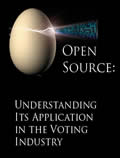Election industry fights open source like it is 1999


But the electronic voting industry's attack on open source is so ridiculous that 20th century references are required. Not that there's anything wrong with that.
The Election Technology Council, which has given us years of questionable election results with systems that can't be audited and whose accuracy thus can't be guaranteed, is out with a white paper saying that, in effect, if code is disclosed only outlaws will have code.
The funniest charge is contained in the group's press release:
Mandating open source requirements, or full software disclosure, upon current proprietary products would open the possibility of a government taking in violation of the United States Constitution. The Fifth Amendment to the U.S. Constitution prohibits the taking of private property without just compensation.
Let me get this right. If I make you tell me how your black box decided who won an election, I'm violating your Constitutional rights? ROFLMAO.
Rice computer science professor Dan Wallach, writing at a Princeton-hosted blog, fisked this better than I could.
Disclosing the source code only results in a complete forfeiture of the software's security if there was never any security there in the first place.
Oh, snap!
If it seems I am not taking the ETC arguments seriously, it's because I'm not. Their arguments against open source demonstrate better than anything critics might say why the industry needs to be reformed.
About that, I'm as serious as a heart attack.